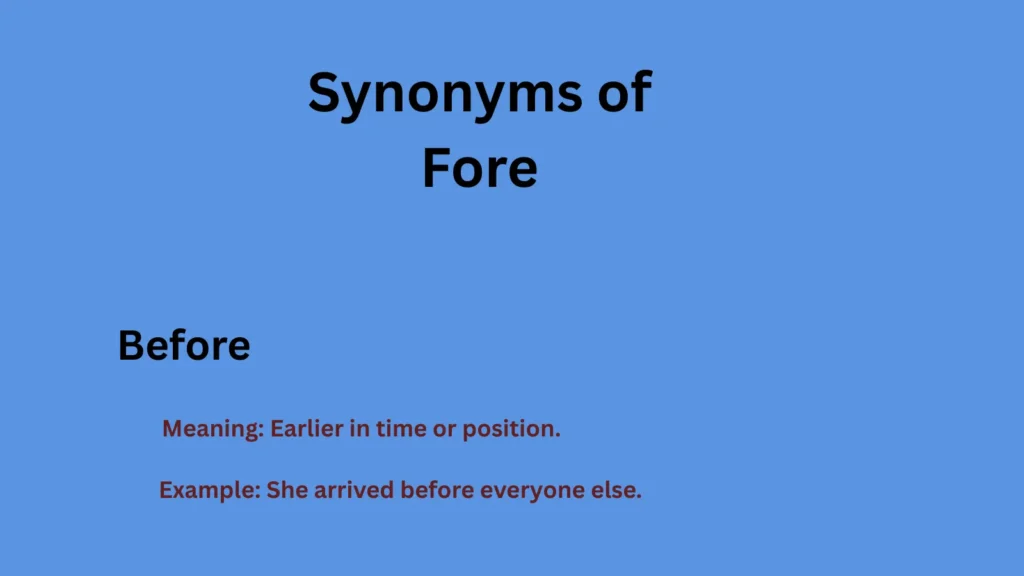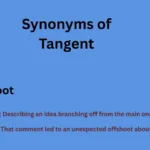Synonyms of Fore, such as front, leading, and primary, offer clear and versatile alternatives to describe something that comes before or is most important. If “fore” feels outdated or too formal, this article presents 30 practical synonyms to help you express the idea with greater clarity and style.
Each synonym for fore includes a clear meaning, an example sentence, and advice on when to use it, whether in everyday conversation, writing, or specialized fields like navigation and sports.
These words help you highlight priority, position, or prominence effectively. If you’re describing a location, ranking, or role, you’ll find the right Fore synonym to fit your context perfectly.
What Does “Fore” Really Mean?
At its core, “fore” means in front of or earlier than—often in a spatial, chronological, or positional sense. For example:
- He stood at the fore of the crowd.
- The issue was brought to the fore in the debate.
It can also mean being ahead in importance, or before in time. It’s formal, sometimes old-fashioned, but still precise and powerful when used correctly.
30 Synonyms of Fore with Definitions, Examples, and Usage Guidance
1. Before
- Meaning: Earlier in time or position.
- Example: She arrived before everyone else.
- Use When: You need a common, time-based word.
2. Ahead
- Meaning: In front or further along.
- Example: He’s miles ahead in his training.
- Use When: You want a more dynamic, forward-moving tone.
3. Front
- Meaning: The most forward part.
- Example: He stood at the front of the line.
- Use When: You mean physical position rather than time.
4. Preceding
- Meaning: Coming before in order or time.
- Example: Refer to the preceding paragraph.
- Use When: You’re writing formally or academically.
5. Prior
- Meaning: Happening earlier.
- Example: I had no prior knowledge of the event.
- Use When: You want to emphasize earlier occurrence or responsibility.
6. Earlier
- Meaning: Happening before a reference point.
- Example: The earlier chapters are more descriptive.
- Use When: You’re comparing two time frames.
7. Initial
- Meaning: First in a sequence.
- Example: The initial reaction was surprise.
- Use When: Emphasizing the beginning stage.
8. Former
- Meaning: Referring to the first of two things mentioned.
- Example: Between tea and coffee, I prefer the former.
- Use When: In structured writing to avoid repetition.
9. Primary
- Meaning: First in importance or order.
- Example: Safety is our primary concern.
- Use When: You want to stress importance, not just order.
10. Frontal
- Meaning: Located at or relating to the front.
- Example: The car suffered frontal damage.
- Use When: In scientific or anatomical contexts.
11. Anterograde
- Meaning: Moving forward (often in medical/neurological settings).
- Example: The patient showed signs of anterograde amnesia.
- Use When: In technical or clinical contexts.
12. Foremost
- Meaning: Leading, most important.
- Example: She’s the foremost expert in her field.
- Use When: You want to show authority or rank.
13. Advance
- Meaning: To move forward.
- Example: They made an advance toward the capital.
- Use When: You want to emphasize progress or movement.
14. Prologue
- Meaning: An introduction or preceding event.
- Example: The prologue set the tone for the novel.
- Use When: In creative writing, especially stories or plays.
15. Introduction
- Meaning: A preliminary section.
- Example: The introduction lays out the argument.
- Use When: In academic or formal texts.
16. Preface
- Meaning: An author’s introductory note.
- Example: He explains his intentions in the preface.
- Use When: Talking about books or speeches.
17. Lead
- Meaning: To go in front or guide.
- Example: He took the lead in negotiations.
- Use When: You want a figurative or leadership context.
18. Vanguard
- Meaning: The forefront of a movement.
- Example: They’re in the vanguard of innovation.
- Use When: You want a bold, modern tone.
19. Forerunner
- Meaning: A predecessor or early version.
- Example: Radio was a forerunner of modern streaming.
- Use When: Describing historical or technological context.
20. Pioneer
- Meaning: A person or thing that comes first or leads.
- Example: She was a pioneer in environmental law.
- Use When: Highlighting innovation or courage.
21. Scout
- Meaning: Someone who goes ahead to gather info.
- Example: The scout reported back about the terrain.
- Use When: You want a sense of exploration or discovery.
22. Pathfinder
- Meaning: One who finds new ways.
- Example: As a pathfinder, he broke barriers in tech.
- Use When: Emphasizing trailblazing or leadership.
23. Outpost
- Meaning: A remote position in front.
- Example: The outpost monitored enemy movement.
- Use When: Describing strategic physical placement.
24. Forepart
- Meaning: The front section of something.
- Example: The forepart of the ship took the brunt.
- Use When: Using nautical or mechanical terms.
25. Antechamber
- Meaning: A room before a main one.
- Example: Guests waited in the antechamber.
- Use When: Describing architectural or ceremonial spaces.
26. Progenitor
- Meaning: An originator or ancestor.
- Example: He was the progenitor of the movement.
- Use When: Talking about origin and influence.
27. Precursor
- Meaning: Something that comes before something else.
- Example: The telegram was a precursor to modern texting.
- Use When: Showing historical development.
28. Trailblazer
- Meaning: Someone who makes new paths.
- Example: A true trailblazer in medicine.
- Use When: You want a dramatic, empowering tone.
29. Harbinger
- Meaning: A signal of something to come.
- Example: Dark clouds were a harbinger of the storm.
- Use When: Talking about signs or warnings.
30. Opening
- Meaning: The first or beginning part.
- Example: The opening act was outstanding.
- Use When: Talking about events, performances, or documents.
Choosing the Right Synonym: Emotional and Cultural Contexts
When choosing a synonym for fore, consider tone, medium, and clarity:
- Formal writing? Use preceding, prior, or initial.
- Creative writing or speeches? Opt for harbinger, vanguard, or prologue.
- Every day speech? Stick with before, ahead, or front.
- Historical or innovative contexts? Use forerunner, trailblazer, or pioneer.
- Technical or medical fields? Choose anterograde, forepart, or progenitor.
Also, note the cultural context. Words like trailblazer and vanguard are often used in American English to show innovation and courage, while preface and prologue are preferred in European literature circles.
Conclusion: How to Use Fore Synonyms Effectively
Understanding and using synonyms of fore can elevate your writing, clarify your message, and align your tone with your intent. The key is matching your synonym choice to the context:
- Is it about time, position, or priority?
- Is your tone formal, casual, or poetic?
- Who is your audience—general readers or technical professionals?
With these 30 alternatives, you now have the tools to move your language forward, just like the meaning of fore itself.

I am Awa White, a passionate writer who loves crafting stories that touch hearts. I explore emotions and everyday life through my words. I strive to inspire and connect with readers through every piece I write.


